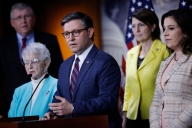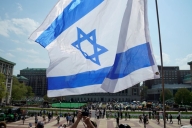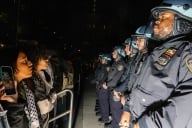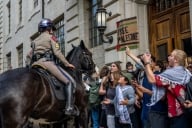You have /5 articles left.
Sign up for a free account or log in.

Gaza City, Oct. 12, 2023.
Mahmud Hams/AFP via Getty Images
Who can speak these days? Do faculty members feel comfortable speaking and writing about controversial topics and societal oppressions on campus? As the world watches the death toll rise in Gaza and the escalation of the Israel-Palestine conflict, can faculty members speak about their positions?
Faculty members regularly avoid speaking about anti-Blackness, anti-Black racism, white supremacy, whiteness, settler colonialism, sexism, sexual misconduct, xenophobia and corporatization of universities and austerity measures. Such avoidance, or even silencing, ensures professors do not engage in independent thought and inquiry as a public good but rather as a private interest. With corporatization, universities operate essentially as producers for the job market, forsaking their traditional mission of fostering creative independent inquiry, challenging perceived beliefs and exploring new horizons.
Since the corporate university is dependent on private rather than state funding, professors are pressured to avoid saying or researching anything controversial because administrators and trustees believe their speech and work may threaten the university’s financial status. Consequently, most faculty members work in fear and worry about asking questions and speaking about systemic oppressions and state-sanctioned terror. This is why most colleagues choose to remain complicit or silent—or, worse, align with their administrations’ oppressive machinations.
Virtually no faculty members speak about or protest the frequent and daily oppression of Black, Indigenous, Latino/a, Arab, LGBTQI and other marginalized people’s experiences on campus and in society because they fear retaliation from corporatized administrators that can cut their academic careers short.
This deliberate silencing leads faculty to avoid speaking out about the diversity, equity, inclusion and justice initiatives sham that does nothing to dismantle the systemic racism fueling the extrajudicial killings of Black people; the hate crimes against Arabs, Muslims and Jewish people; and a routine avoidance to engage in any conversations about the daily macro-violences towards Asians, Asian Americans and foreign-born citizens on campus. Moreover, these initiatives have done little to increase the proportion of historically oppressed faculty at predominantly white universities and colleges.
The truth is that these days there is an overwhelming hesitance or fear of speaking up. There is fear of being marked as angry, hostile or divisive. There is fear of being accused of being Islamophobic or antisemitic. There is fear of being harassed. There is fear of being prosecuted. There is a growing fear that academic freedom is dead and speaking up will cost one their job.
Many of us, particularly faculty who are members of racially oppressed groups, are fully aware of the suppression of our speech and academic freedom. Oppression has contexts and histories, and some professors view it as our professional obligation to contextualize and historicize contentious topics and problems if we are serious about our intellectual missions.
Faculty from oppressed groups in the social sciences and the humanities contribute to public understanding of historic and contemporary atrocities like slavery, settler colonialism, apartheid, subjugation and genocide and seek to raise awareness about the cultural, institutional and structural dimensions of systemic oppressions. Yet, our efforts to these ends more often than not are met with threats and vilification by proponents of oppression. In the age of the corporatized university, faculty are subtly but explicitly counseled to be neutral (when researching and writing about oppression) or to remain silent about the normative violence of white supremacy and heteropatriarchal capitalism’s oppression and imperialism at home and abroad. We are subjected to censorship, or we willingly engage in self-censorship, to evade the significant reputational harm the oppressive establishment can do to our careers.
Presidents of universities usually do not speak up about systemic oppressions. When they do (due to pressures from students and everyday people) their opinions are so muted or guarded that their words are meaningless and odious. Given that they are courtiers for oppressors, who are their funding source, they refuse to be standard bearers for academic freedom.
And this brings us to an urgent question that is no longer avoidable: Can we as faculty members speak about the ongoing Palestine-Israel conflict on our college and university campuses? Do university presidents have any obligation to present fair and balanced statements during times of national or international crisis?
There has been much horror, pain and outrage since Oct. 7, as the death toll has increased in Israel and is still rising in a besieged Gaza. Some professors have voiced our stances on social media, written op-eds for news outlets or spoken to students and colleagues in silos, and yet the overall silence on our campuses is disturbing. While some presidents have said absolutely nothing at all, a routine avoidance to deter any controversy, others (like Harvard University’s president) have condemned the horrific violence perpetuated by Hamas on the people of Israel and have said nothing about the unprecedented deaths of Palestinian civilians resulting from the complete siege by Israel.
While condemning Hamas for their insurgency and the collective death is an ethical obligation for university presidents, the collective punishment imposed on innocent Palestinian civilians has precipitated nothing but silence. This display of differentiated mourning and selective outrage reveals whose lives matter and whose do not.
And then there are pressures from donors for statements made about the Israel-Palestine conflict. In Harvard’s case, the Wexner Foundation, “a philanthropic organization focused on cultivating Jewish leadership,” is cutting ties with the university over what it described as its inadequate response to Hamas’s Oct. 7 attack.
At the University of Pennsylvania, another donor, David Magerman, castigated Penn’s “misguided moral compass” in a letter to President Elizabeth Magill and board chair Scott Bok. He cited the university’s hosting of the Palestine Writes Literature Festival last month and its response to the Hamas attack on Israel as reasons to cease all donations.
Meanwhile, the Penn community has protested Magill’s statement distancing the university from the Palestinian literary festival, and participants in the festival have written their own position statement on the recent “terrifying escalation” in Gaza.
In light of the warning by a United Nations human rights expert that “Palestinians are in grave danger of mass ethnic cleansing,” we are deeply disturbed by acts of censorship and by the chilling of speech and academic freedom on college and university campuses in the U.S. A comprehensive statement by the board of the Middle East Studies Association (MESA) on Palestine and Israel must be followed by a reaffirmation of academic freedom for faculty and students. MESA’s statement noted that for its North American members, “describing, analyzing and commenting on developments in Israel/Palestine, their causes and their consequences is in many cases being discouraged or silenced, whether on university campuses, in their communities, or in the media. There has been a swift and dramatic narrowing of permissible speech on Israel/Palestine that strikes at the heart of academic freedom.”
The U.S. government, which had presented itself as a neutral referee in the Palestine-Israel conflict, is now making it clear it sides with its settler-colonial counterpart—Israel. Because of this partiality, there is much fear among Muslim and Arab students that there will be an escalation in Islamophobia, anti-Arab violence and hate crimes. This fear has already been realized, as we have witnessed one murder, of a 6-year-old Palestinian American boy, Wadea Al-Fayoume, killed in the Chicago area in an alleged hate crime by his family’s landlord. Al-Fayoume was stabbed 26 times. U.S. attorney general Merrick B. Garland said in a statement, “this incident cannot help but further raise the fears of Muslim, Arab and Palestinian communities in our country with regard to hate-fueled violence.”
At the very least, we hope that people, irrespective of their position on Israel or Palestine, are not silenced or threatened and that faculty stop caring about how power will respond to the truth and focus more on using their knowledge production to create a more empathetic and human-centered university and world. Given that oppressors and their systems of oppression are violent and seek to maintain their domination through coercion, faculty efforts to help create a just and beloved community will always face pushback. We must speak loudly and clearly despite attempts to humiliate, threaten and render us jobless for disrupting global structural oppression.
It is our hope that faculty members actually speak up about the condition of the people suffering and dying under the oppressive boot of the settler-colonial state of Israel. On the same note, it is vital to acknowledge the pain and devastation many Jewish students, faculty and staff on our campuses are experiencing because of the terrorist attack by Hamas that killed innocent Jewish people. Let us be clear. Speaking about or against oppressive regimes and ideologies that use state-sanctioned powers to inflict collective punishments to achieve their goals does not constitute antisemitism or Islamophobia.
For as Arundhati Roy aptly observed, “there’s really no such thing as the ‘voiceless.’ There are only the deliberately silenced, or the preferably unheard.”








